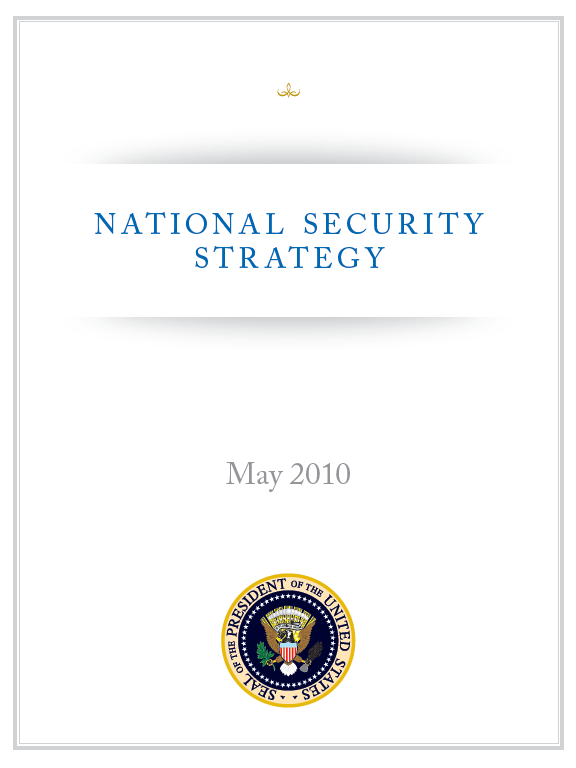 NATIONAL SECURITY STRATEGY
NATIONAL SECURITY STRATEGY
- 60 pages
- May 2010
“More than at any point in human history—the interests of nations and peoples are shared. The religious convictions that we hold in our hearts can forge new bonds among people, or tear us apart. The technology we harness can light the path to peace, or forever darken it. The energy we use can sustain our planet, or destroy it. What happens to the hope of a single child—anywhere—can enrich our world, or impoverish it.”
—President Barack Obama, United Nations General Assembly, September 22, 2009…
Prevent Attacks on and in the Homeland: To prevent acts of terrorism on American soil, we must enlist all of our intelligence, law enforcement, and homeland security capabilities. We will continue to integrate and leverage state and major urban area fusion centers that have the capability to share classified information; establish a nationwide framework for reporting suspicious activity; and implement an integrated approach to our counterterrorism information systems to ensure that the analysts, agents, and officers who protect us have access to all relevant intelligence throughout the government. We are improving information sharing and cooperation by linking networks to facilitate Federal, state, and local capabilities to seamlessly exchange messages and information, conduct searches, and collaborate. We are coordinating better with foreign partners to identify, track, limit access to funding, and prevent terrorist travel. Recognizing the inextricable link between domestic and transnational security, we will collaborate bilaterally, regionally, and through international institutions to promote global efforts to prevent terrorist attacks.
…
Empowering Communities to Counter Radicalization: Several recent incidences of violent extremists in the United States who are committed to fighting here and abroad have underscored the threat to the United States and our interests posed by individuals radicalized at home. Our best defenses against this threat are well informed and equipped families, local communities, and institutions. The Federal Government will invest in intelligence to understand this threat and expand community engagement and development programs to empower local communities. And the Federal Government, drawing on the expertise and resources from all relevant agencies, will clearly communicate our policies and intentions, listening to local concerns, tailoring policies to address regional concerns, and making clear that our diversity is part of our strength—not a source of division or insecurity.
Improve Resilience Through Increased Public-Private Partnerships: When incidents occur, we must show resilience by maintaining critical operations and functions, returning to our normal life, and learning from disasters so that their lessons can be translated into pragmatic changes when necessary. The private sector, which owns and operates most of the nation’s critical infrastructure, plays a vital role in preparing for and recovering from disasters. We must, therefore, strengthen public-private partnerships by developing incentives for government and the private sector to design structures and systems that can withstand disruptions and mitigate associated consequences, ensure redundant systems where necessary to maintain the ability to operate, decentralize critical operations to reduce our vulnerability to single points of disruption, develop and test continuity plans to ensure the ability to restore critical capabilities, and invest in improvements and maintenance of existing infrastructure.
…
Shift To Greater Domestic Demand Abroad: For the rest of the world, especially in some emerging market and developing countries, a better balance means placing greater emphasis on increasing domestic demand as the leading driver of growth and opening markets. Those countries will be able to import the capital and technologies needed to sustain the remarkable productivity gains already underway. Rebalancing will provide an opportunity for workers and consumers over time to enjoy the higher standards of living made possible by those gains. As balanced growth translates into sustained growth, middle-income, and poor countries, many of which are not yet sufficiently integrated into the global economy, can accelerate the process of convergence of living standards toward richer countries—a process that will become a driver of growth for the global economy for decades to come.
…
Building a Broader Coalition of Actors to Advance Universal Values: We are working to build support for democracy, rule of law, and human rights by working with other governments, nongovernmental organizations, and multilateral fora. The United States is committed to working to shape and strengthen existing institutions that are not delivering on their potential, such as the United Nations Human Rights Council. We are working within the broader U.N. system and through regional mechanisms to strengthen human rights monitoring and enforcement mechanisms, so that individuals and countries are held accountable for their violation of international human rights norms. And we will actively support the leadership of emerging democracies as they assume a more active role in advancing basic human rights and democratic values in their regions and on the global stage.
Marshalling New Technologies and Promoting the Right to Access Information: The emergence of technologies such as the Internet, wireless networks, mobile smart-phones, investigative forensics, satellite and aerial imagery, and distributed remote sensing infrastructure has created powerful new opportunities to advance democracy and human rights. These technologies have fueled people-powered political movements, made it possible to shine a spotlight on human rights abuses nearly instantaneously, and increased avenues for free speech and unrestricted communication around the world. We support the dissemination and use of these technologies to facilitate freedom of expression, expand access to information, increase governmental transparency and accountability, and counter restrictions on their use. We will also better utilize such technologies to effectively communicate our own messages to the world.
